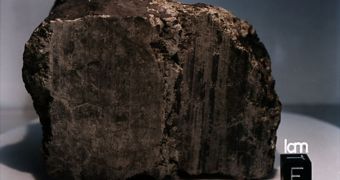Scientists based at the Carnegie Institution for Science in Washington have recently established that complex, carbon-based chemistry can take place on the surface of the Red Planet. Whether or not this continues to happen to this day is still unclear.
The investigation was based on a number of meteorites that arrived here on Earth from Mars. The two planets are known to have exchanged rocks and other material over time. What is interesting about the new study is that the Martian meteorites the team surveyed can support macromolecules.
These are very large molecules that contain carbon, and include hydrogen and other chemicals. It's important to note here that none of the molecules the Carnegie team found was of biological origin.
The group identified reduced carbon molecules as well, which are made up of carbon bound to either itself, or to hydrogen. This discovery will enable scientists to gain a better understanding of the chemistry our neighboring world is capable of.
Details of the new study were published in the May 24 online issue of the top journal Science Express.
“These findings show that the storage of reduced carbon molecules on Mars occurred throughout the planet's history and might have been similar to processes that occurred on the ancient Earth,” explains Carnegie researcher Andrew Steele, the lead author of the new paper.
“Understanding the genesis of these non-biological, carbon-containing macromolecules on Mars is crucial for developing future missions to detect evidence of life on our neighboring planet,” he goes on to say.
This is not the first time that Martian meteorites have revealed large chains of carbon and hydrogen. However, a lot of debate has been raging on in the scientific community about whether these molecules formed inside the meteorites, or actually came from the surface of the planet.
The new discoveries put that debate to rest. “Although this study has not yielded evidence that Mars has or once may have supported life, it does address some important questions about the sources of organic carbon on Mars,” Mary Voytek adds.
“With the Curiosity rover scheduled to land in August, these new research results may help Mars Science Laboratory scientists fine-tune their investigations on the surface of the planet by understanding where organic carbon may be found and how it is preserved,” she adds.
Voytek holds an appointment as the director of the Astrobiology Program, at NASA Headquarters, in Washington DC.

 14 DAY TRIAL //
14 DAY TRIAL //